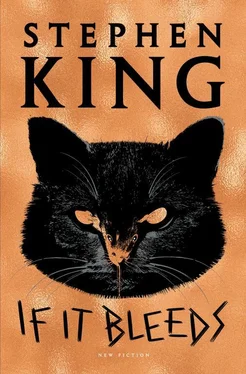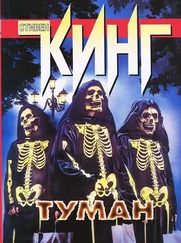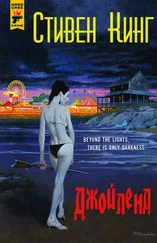Only on the counter by the sink were there signs of his occupancy the previous October: the Coleman lantern, the tin of lantern fuel, a bag of Halls cough drops, several packets of Goody’s Headache Powder, half a bottle of Dr. King’s Cough & Cold Remedy, and his wristwatch.
The fireplace was scrubbed clean of ash. It had been loaded with fresh chunks of oak, so Drew supposed Young Jackie had either had the chimney swept or done it himself. Very efficient, but there would be no need of a fire in this August heat. He went to the fireplace, knelt, and twisted his head to stare up into the black throat of the chimney.
“Are you up there?” he called… and with no self-consciousness at all. “If you’re up there, come down. I want to talk to you.”
Nothing, of course. He told himself again there was no rat, had never been a rat, except there was. The splinter wasn’t coming out. The rat was in his head. Only that wasn’t completely true, either. Was it?
There were still two crates flanking the spandy-clean fireplace, fresh kindling in one, toys in the other—the ones left here by his kids and those left by the children of whomever Lucy had let the cabin to in the few years they’d rented it. He grabbed the crate and dumped it. At first he didn’t think the stuffed rat was there, and he felt a stab of panic, irrational, but real. Then he saw it had tumbled under the hearth, nothing sticking out but its cloth-covered rump and stringy tail. What an ugly toy it was!
“Thought you’d hide, did you?” he asked it. “No good, Mister.”
He took it over to the sink and dropped it in. “Got anything to say? Any explanations? Maybe an apology? No? What about any last words? You were chatty enough before.”
The stuffed rat had nothing to say, so Drew doused it with lantern fluid and set it on fire. When there was nothing left but smoking, foul-smelling slag, he turned on the water and doused the remains. There were a few paper bags under the sink. Drew used a spatula to scrape what was left into one of these. He took the bag down to Godfrey Brook, tossed it in, and watched it float away. Then he sat down on the bank and looked at the day, which was windless and hot and gorgeous.
When the sun began to sink, he went inside and made a couple of bologna sandwiches. They were sort of dry—he should have remembered to get mustard or mayo—but he had the beer to wash them down. He drank three cans, sitting in one of the old armchairs and reading an Ed McBain paperback about the 87th Precinct.
Drew considered a fourth beer and decided against it. He had an idea that was the one with the hangover in it, and he wanted to get an early start in the morning. He was done with this place. As he was with writing novels. There was just the one, his only child waiting for him to finish with it. The one that had cost his friend and his friend’s wife their lives.
“I don’t believe that,” he said as he climbed the stairs. At the top he looked down at the big main room, where he had started his book and where—for a little while, anyway—he had believed he would die. “Except I do. I do believe that.”
He undressed and went to bed. The beers sent him off to sleep quickly.
39
Drew awoke in the middle of the night. The bedroom was gilded silver with the light of a full August moon. The rat was sitting on his chest, staring at him with those little black bulging eyes.
“Hello, Drew.” The rat’s mouth didn’t move, but the voice was coming from him, all right. Drew had been feverish and sick the last time they conversed, but he remembered that voice very well.
“Get off me,” Drew whispered. He wanted to strike it away (he wanted to bat the rat , so to speak), but he seemed to have no strength in his arms.
“Now, now, don’t be like that. You called me and I came. Isn’t that the way it works in stories like this? Now just how can I help you?”
“I want to know why you did it.”
The rat sat up, holding his little pink paws to his furry chest. “Because you wanted me to. It was a wish, remember?”
“It was a deal .”
“Oh, you college types with your semantics.”
“The deal was Al ,” Drew insisted. “Just him . Since he was going to die of pancreatic cancer anyway.”
“I don’t remember pancreatic cancer ever being specified,” said the rat. “Am I wrong about that?”
“No, but I assumed…”
The rat did a face-washing thing with his paws, turned around twice—the feel of those paws was nauseating, even through the quilt—and then regarded Drew again. “That’s how they get you with magic wishes,” he said. “They’re tricky. Lots of fine print. All the best fairy tales make that clear. I thought we discussed that.”
“Okay, but Nadine Stamper was never a part of it! Never a part of our… our arrangement!”
“She was never not a part of it,” the rat replied, and rather prissily.
It’s a dream , Drew thought. Another dream, got to be. In no version of reality could a man be lawyered at by a rodent.
Drew thought his strength was coming back, but he made no move. Not yet. When he did it would be sudden, and it wouldn’t be to slap the rat or bat the rat . He intended to catch the rat and squeeze the rat. He would writhe, he would squeal, and he would almost certainly bite, but Drew would squeeze until the rat’s belly ruptured and his guts erupted from his mouth and his asshole.
“All right, you might have a point. But I don’t understand. The book was all I wanted, and you spoiled it.”
“Oh boo-hoo,” said the rat, and gave his face another dry wash. Drew almost pounced then, but no. Not quite yet. He had to know.
“Fuck your boo-hoo. I could have killed you with that shovel, but I didn’t. I could have left you out in the storm, but I didn’t. I brought you in and put you by the stove. So why would you repay me by killing two innocent people and stealing the pleasure I felt in finishing the only book I’ll ever write?”
The rat considered. “Well,” he said at last, “if I may slightly change an old punchline, you knew I was a rat when you took me in.”
Drew pounced. He was very fast, but his clutching hands closed on nothing but air. The rat scurried across the floor, but before he reached the wall, he turned back to Drew, seeming to grin in the moonlight.
“Besides, you didn’t finish it. You never could have finished it. I did.”
There was a hole in the baseboard. The rat ran into it. For a moment Drew could see his tail. Then he was gone.
Drew lay looking up at the ceiling. In the morning I will tell myself this was a dream , he thought, and in the morning that was what he did. Rats did not talk and rats did not grant wishes. Al had cheated cancer only to die in a car accident, dreadfully ironic but not unheard-of; it was a shame his wife had died with him, but that was not unheard-of, either.
He drove home. He entered his preternaturally quiet house. He went upstairs to his study. He opened the folder containing the copyedited manuscript of Bitter River and prepared to go to work. Things had happened, some in the real world and some in his head, and those things could not be changed. The thing to remember was that he had survived. He would love his wife and children as best he could, he would teach the best he could, he would live the best he could, and he would gladly join the ranks of one-book writers. Really, when you thought about it, he had nothing to complain about.
Really, when you thought about it, everything was all rat.
When my mom or one of my four aunties happened to see a lady pushing a pram, they were apt to chant something they probably learned from their mother: “Where did you come from, baby dear? Out of the nowhere and into the here.” I sometimes think of that bit of doggerel when I’m asked where I got the idea for this or that story. I often don’t know the answer, which makes me embarrassed and a little ashamed. (Some childhood complex at work there, no doubt.) Sometimes I give the honest answer (“No idea!”), but on other occasions I just make up some bullshit, thus satisfying my questioner with a semi-rational explanation of cause and effect. Here, I will try to be honest. (Of course that’s what I would say, isn’t it?)
Читать дальше








